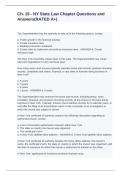Exam (elaborations)
Ch. 19 - NY State Law Chapter Questions and Answers(RATED A+)
- Course
- Institution
The Superintendent has the authority to take all of the following actions, except: a. Foster growth in the financial industry b. Create insurance laws c. Mediate consumer complaints d. Create rules to implement and enforce insurance laws - ANSWER-b. Create insurance laws The New York Assem...
[Show more]



